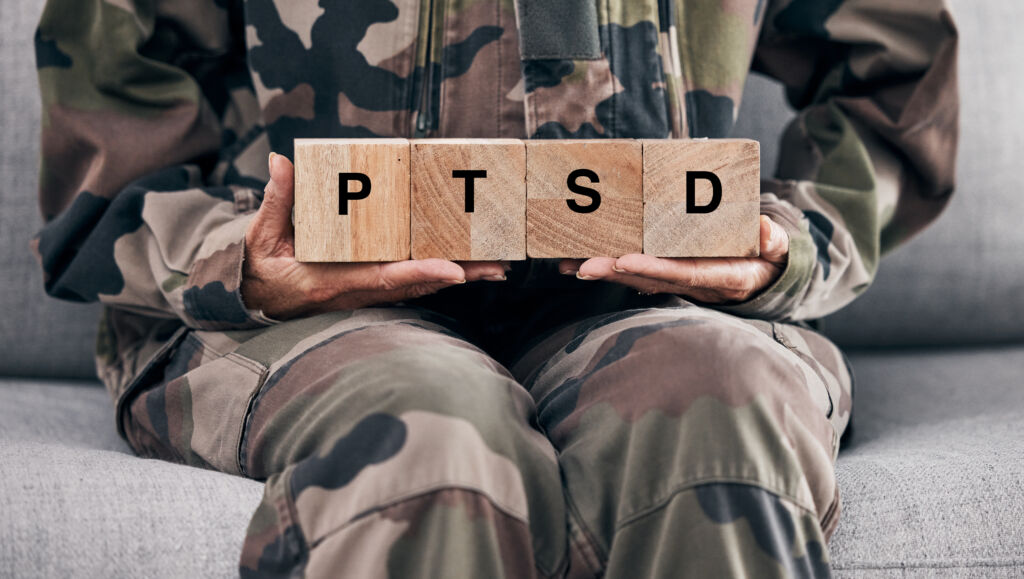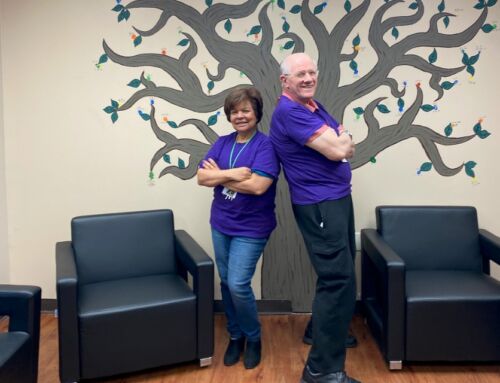 June is PTSD (posttraumatic stress disorder) Awareness Month. There are currently about 12 million people in the United States with PTSD. PTSD is a mental health problem that some people develop after experiencing or witnessing a life-threatening event, like combat, a natural disaster, a car accident, or sexual assault.
June is PTSD (posttraumatic stress disorder) Awareness Month. There are currently about 12 million people in the United States with PTSD. PTSD is a mental health problem that some people develop after experiencing or witnessing a life-threatening event, like combat, a natural disaster, a car accident, or sexual assault.
According to the National Center for PTSD, about 6 of every 10 men (60%) and 5 of every 10 women (50%) will experience at least one trauma in their lives. PTSD is more common among Veterans than civilians. At some point in their life, 7 out of every 100 Veterans (or 7%) will have PTSD. PTSD is also more common among female Veterans (13 out of 100, or 13%) versus male Veterans (6 out of 100, or 6%).
War zone deployment, training accidents and military sexual trauma (or, MST) lead to PTSD. In some studies, PTSD is 3 times more likely among Veterans who deployed compared to those who did not (of the same service era). Some factors in a combat situation may contribute to PTSD and other mental health problems, including military occupation or specialty, the politics around the war, where the war is fought, and the type of enemy faced.
Veterans may experience the following reactions related to events such as war, mass violence or disasters:
- Feeling frustrated, sad, fearful, helpless, distressed (including moral distress), angry or betrayed
- Experiencing an increase in mental health symptoms like symptoms of PTSD or depression
- Unable to turn away from news or social media coverage
- Sleeping poorly, drinking more or using more drugs
- Trying to avoid all reminders or shy away from social situations
- Having more military and homecoming memories
- Worrying for the safety of people who were affected
- Feel guilt that they can’t do more about the situation
Veterans also may feel like they need to expect and/or prepare for the worst and may become overly protective, vigilant and guarded.
What Are the Symptoms of PTSD?
There are 4 types of PTSD symptoms:
- Reliving the event (also called re-experiencing symptoms). Memories of the traumatic event can come back at any time. They can feel very real and scary. You may have nightmares or you may experience flashbacks. You may see, hear or smell something that causes you to relive the event. News reports, seeing an accident, or hearing fireworks are examples of trauma reminders.
- Avoiding things that remind you of the event. You may try to avoid situations or people remind you of the trauma event. You may even avoid talking or thinking about the event. Sometimes you may avoid crowds because they feel dangerous or you may avoid driving if you were in a car accident or if your military convoy was bombed.
- Having more negative thoughts and feelings than before the event. The way you think about yourself and others may become more negative because of the trauma. You may feel numb—unable to have positive or loving feelings toward other people—and lose interest in things you used to enjoy. You may forget about parts of the traumatic event or you may think the world is completely dangerous, and no one can be trusted.
- Feeling on edge or keyed up (also called hyperarousal). You may be jittery, or always alert and on the lookout for danger. You might suddenly become angry or irritable. You may have a hard time sleeping or you may find it hard to concentrate. You may be startled by a loud noise or surprise.
Many who suffer from PTSD may act in unhealthy ways, like smoking, abusing drugs or alcohol, or driving aggressively.
Greenbranch Recovery offers drug and alcohol rehab and mental health treatment programs specifically for military veterans.
Unfortunately, most people who have PTSD don’t get the help they need even though PTSD treatments work. Everyone with PTSD—whether they are Veterans or civilian survivors of sexual assault, serious accidents, natural disasters, or other traumatic events—can lead a better quality of life after treatment. Both trauma-focused psychotherapy and medication are proven to treat PTSD. There is no one treatment that is right for everyone.
Greenbranch Recovery and our veteran patients work to overcome stigmas and root causes of mental and physical pain, building a recovery program tailored to the specific concerns of visible and invisible wounds of battle. If you or someone you love needs help for drug or alcohol abuse, specialty treatment programs are available. Contact us today.
The 3 most effective types of trauma-focused psychotherapy are:
- Cognitive Processing Therapy (CPT) where you learn skills to understand how trauma changed your thoughts and feelings. Changing how you think about the trauma can change how you feel.
- Prolonged Exposure (PE) where you talk about your trauma repeatedly until memories are no longer upsetting. This will help you get more control over your thoughts and feelings about the trauma.
- Eye Movement Desensitization and Reprocessing (EMDR) – People with PTSD react negatively to the memory of their traumas. EMDR can change how you react to memories of your trauma over a period of time.
Some more general coping strategies for PTSD include:
- Engaging in positive, healthy activities that are rewarding, meaningful, or enjoyable
- Staying connected by spending time with people who give you a sense of security, calm, or happiness, or those who best understand what you are feeling
- Practicing good self-care by engaging in activities such as listening to music, exercising, practicing breathing routines, or spending time in nature or with animals
- Sticking to your routines and follow a schedule for when you sleep, eat, work and do other day-to-day activities
- Limiting news and social media exposure especially if it is increasing your distress
If you or your loved one is suffering from PTSD, don’t suffer in silence. Call us TODAY.




